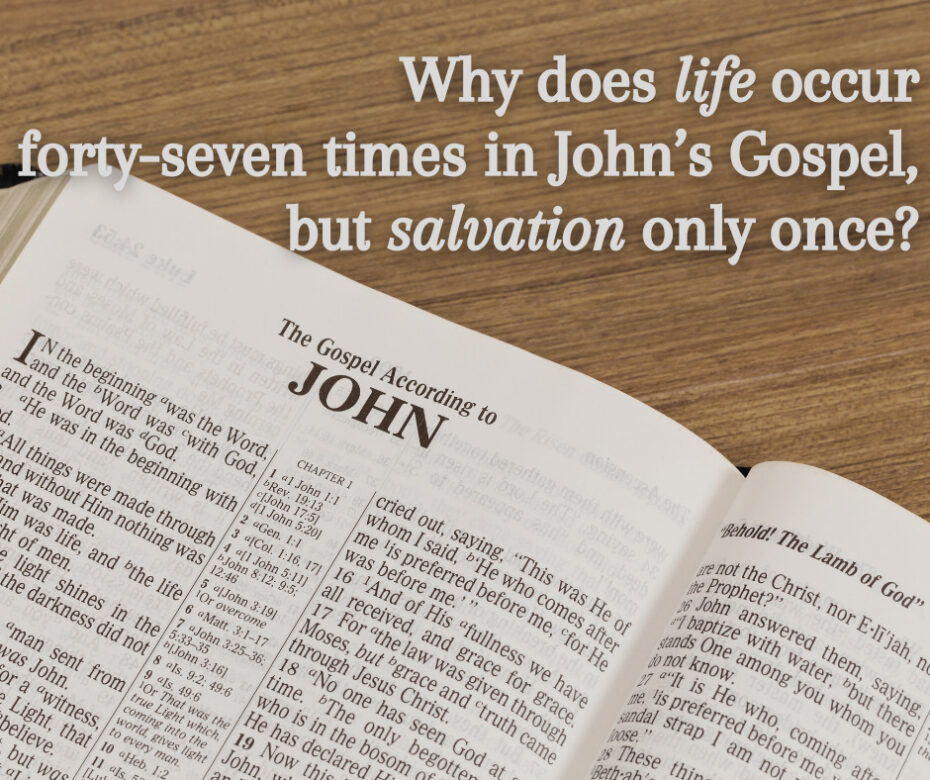Dave Wyant, one of the students in my soteriology class, shared a chart he saw where someone compared word frequencies in John and the Synoptic Gospels. I have created my own chart, highlighting the words I think are most important for Free Grace Theology. Bolded numbers indicate words or expressions emphasized by many or few uses.
Word/Expression Synoptic Gospels John Unmodified Life ([zoē] by itself) 29 30i Eternal/Everlasting Life 8 17 Believe (pisteuō) 35 100 Kingdom (basilea) 122 5ii Repent/Repentance (metanoeō/metanoia) 26 0 Save 38iii 5iv Savior (sōtēr) 2 1 Salvation (sōtēria) 5v (all in Luke) 1
This chart presents what theologians call Biblical Theology. Instead of looking at how a given word or concept is used throughout the Bible (or one testament), Biblical Theology looks at how a given author uses a word or concept.
Based on word frequencies in John’s Gospel, as compared to the other Gospels, we can learn the following about the theology John presents:
- Belief is a central theme in John’s Gospel but not the Synoptics.
- Life, not salvation, is emphasized in John.
- Kingdom is emphasized in the Synoptic Gospels but not in John.
- Repentance is an important theme in the Synoptics but not in John.
- Being saved (primarily from sickness, enemies, and physical death) is emphasized in the Synoptics but not in John (see note iii).
According to John 20:30-31, John wrote to unbelievers to lead them to faith in Christ for everlasting life. That is evident in the word usage chart.
Charts like this do not interpret themselves. You still must study the individual books. But word studies are vital to exegesis, and word frequency is often a major indicator of what an author is emphasizing (or ignoring).
_________
i Most of these refer to everlasting life. I will do a separate blog on the unmodified uses of zoē in John.
ii Twice in John 3 to Nicodemus (3:3, 5) and three times in John 18:36 before Pilate.
iii Sōzō in the Synoptics refers to the future national deliverance of Israel from the Gentiles (Matt 1:21; Luke 1:71), salvation from drowning (Matt 8:25; 14:30), from the Tribulation wrath (Matt 10:22; 24:13, 22; Mark 13:13, 20), from the cross (Matt 27:40, 42, 49; Mark 15:30, 31 twice; Luke 23:35 twice, 37, 39), from death (Mark 3:4; Luke 6:9), from illness (Luke 7:50), and rarely, salvation from eternal condemnation (Mark 10:26; 16:16[?]; Luke 8:12; 9:56; 13:23; 18:26; 19:10) . There are also some uses that refer to enhancing one’s life now or in the life to come, saving the psyche (Matt 16:25; Mark 8:35 twice; Luke 9:24-25; 17:33). There are also six uses of sōzō that refer to healing that are translated as made you well (Matt 9:22; Mark 5:34; 10:52; Luke 8:48; 17:19; 18:42).
iv Four times, it refers to giving people everlasting life (John 3:17; 5:34; 10:9; 12:47). Once, it refers to Jesus saying that though His soul was troubled, He would not ask the Father to “save Me from this hour…for this purpose I came into the world” (John 12:47).
v Most of these refer to the future national salvation of Israel from the Gentiles (Luke 1:69, 71; 2:30; 3:6). Only Luke 19:9 refers to salvation from eternal condemnation.


